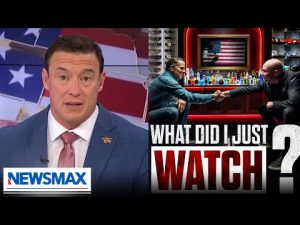In the bustling streets of New York City, a debate is brewing that promises to stir up plenty of chatter, not just among commuters, but also within the political arena. The topic at hand? Congestion pricing. This plan has been a hot potato ever since it was first proposed, and now it’s back in the spotlight with incoming President Trump firmly against it. New York Congresswoman Nicole Malliotakis, an outspoken critic of the plan, is rallying her efforts to ensure it doesn’t take effect.
Malliotakis has made it clear that the president-elect is not backing down from his promise to terminate congestion pricing. Just last week, she met with Trump, and he reiterated his belief that this pricing scheme would hurt New York’s economy and its residents. Malliotakis believes the state’s decision to pursue congestion pricing falls squarely on the shoulders of New York Democrats, particularly Governor Kathy Hochul. As far as Malliotakis is concerned, this mess is a significant challenge that requires federal intervention, and she is determined to find solutions through legal and legislative channels.
A notable concern surrounding congestion pricing is its potential environmental impact. A lawsuit is currently in the works, citing violations of federal law due to a lack of thorough environmental assessments. This is crucial, as the National Environmental Policy Act mandates a full study before implementing such sweeping changes. Malliotakis feels confident that the courts will side with them, enabling a fresh look at the potential repercussions of congestion pricing. It seems that even former Governor Andrew Cuomo, who initially signed the law, has called for further studies before moving forward.
In the grand scheme of things, congestion pricing is not just about fees collected from drivers. It also encompasses broader implications for public transportation. The trains that many rely on every day are managed by an independent authority that, while state-operated, heavily leans on federal funding. Malliotakis is keen on establishing a partnership with Governor Hochul to improve the safety and aesthetics of the transit system. However, she believes Hochul’s recent actions are less about collaboration and more about aggravation, as they clash with Trump’s determined stance against congestion pricing.
From the perspective of daily commuters, the announcement of congestion pricing would feel like an additional tax burden. With rising fares and tolls already weighing heavily on New Yorkers, many are likely already feeling the pinch. Malliotakis highlights the crucial need for transparency and accountability in the Metropolitan Transportation Authority (MTA). The current scenario, described as a “black hole” consuming funds without delivering adequate services, raises serious red flags. With crime on the rise in subway stations, her call to hire more police officers resonates strongly—after all, who’d want to pay to park in a city when public transportation seems like a risky gamble?
As the showdown continues, it remains to be seen how this battle over congestion pricing will unfold. Congresswoman Malliotakis, with her unwavering resolve and a sense of humor mixed in, is on a mission. While she navigates the complexities of federal intervention and state cooperation, one thing is for sure: she and her fellow conservatives are prepared to fight for the pocketbooks and safety of New Yorkers. The clock is ticking, and the fate of congestion pricing could hinge on the political maneuvering in the coming weeks. As this story develops, it’s clear that New Yorkers are in for quite a ride, and they’ll be watching closely.







